- Home
- Neal Asher
Gridlinked Page 9
Gridlinked Read online
Page 9
‘Now, I will ask again, because it is of a great deal of interest to me, are you all in position?’
Abram was noted for his relentless sarcasm. Many of his constables found it more frightening to be summoned into his presence than pulled before some of the other more explosive officers. He knew this, but just could not help himself, sometimes wondering if it was a sickness. He nodded to himself as four positive replies came back to him over the radio.
‘Now I strongly suggest that when I say the word “Go”—that wasn’t it by the way, it will be a moment yet—that you break down a few doors and arrest Alan Tenel for his numerous crimes. Now . . . Go?’
Abram raised his binoculars again and increased the magnification. Those who had braved his sarcasm to ask him why he used such an old instrument always got the same reply: ‘Image intensifiers are the product of characterless technology. I will use them only when necessary.’ It was perhaps half the truth. He knew it was probably more to do with establishing a kind of individualism: a common pastime in the vast sprawl of humanity.
He watched two of his officers moving onto the veranda. From the back of the house came the sound of breaking glass. There was a flash that momentarily blacked the binoculars’ lenses. When the blackness faded, the officers were gone from view, but he could still hear them.
‘Alan Tenel, get up and move away from the bed. Hands out in front of you.’
‘What? . . . Who the hell do you think you are?’
‘I won’t ask a second time.’
‘This is private property. How dare you!’
‘Tenel, you’re a Separatist shit and you’re under arrest. You can walk out of here fully dressed or I can drag you out by your ankles and focus the lights on you. Plenty of blade beetles waiting out there . . . That’s better.’
‘Excellent reading of his rights, Pearson. I must remember that approach line next time I’m lecturing new recruits,’ said Abram.
Nothing more than sounds of movement came over the radio for a moment.
‘Sorry, sir, but he seemed a bit reluctant to co-operate.’
Abram emerged from the orchard as his constables hauled Tenel out of his house. Pearson, who, like a lot of the older recruits, was a heavy-G adaptation, had one hand clamped on Tenel’s upper arm. Abram studied carefully this man they had arrested.
Tenel was small and old, and didn’t look as if he could offer any trouble. Pearson and Alex were capable of tearing the man in half between them, and Jack and Solen, walking behind, both towered a head and a half above him. Abram momentarily wondered if the information given them had been mistaken, then dismissed the thought. ECS did not make that kind of error. As Tenel drew closer, Abram began to note a certain weasely confidence.
‘You do know why you’ve been arrested, I take it?’ he asked.
‘You’ve made a mistake, First Constable—one for which you’ll pay dearly,’ said Tenel.
Abram wondered what that meant: was it the usual bluster of men with a bit more in their bank accounts than the general population, or something more sinister?
‘I never pay dearly for my mistakes,’ said Abram. ‘I’m a policeman.’
‘You won’t be laughing when they . . .’
Tenel stared beyond Abram and over to the right. Suddenly his eyes grew wide and his mouth dropped open. He pulled against the grip the two constables held on him—then he pulled harder.
‘You have to get me out of here,’ he said quickly.
Abram stared at him.
‘You have to get me out of here!’
As Tenel struggled harder, there was spittle on his chin. Abram glanced round and saw, standing at the edge of the orchard, a very tall and odd-looking man.
‘Ground him,’ Abram ordered. ‘Pearson, Jack, with me.’
As Pearson released Tenel’s arm, Alex tripped the prisoner and forced him face-down on the ground. Solen dropped to a crouch, aiming the stubby laser carbine he was holding. Abram began walking towards the odd man, with Pearson and Jack behind him. He heard the various sliding metallic sounds as laser carbines were brought to bear and primed. Probably OTT again. This individual was more than likely a gardener employed because he was so uncommonly tall and could prune the trees more easily than most.
‘No, let me go!’ Tenel shouted, then his cries became muffled, no doubt as Alex shoved his face into the dirt. Abram smiled to himself; Alex was not above a little brutality when necessary. He hooked his binoculars on his belt and rested his hand on the butt of his pulse-gun. The tall man stepped further out from the trees, then stopped, very still. Abram felt a momentary nervousness, then told himself not to be ridiculous; he had two of the toughest cops on the force with him.
‘Who are you?’ he asked when they got closer.
The man started moving towards them, his lanky strides eating up the ground in between.
‘I suggest you stop right there.’ Abram drew his pulse-gun.
The man just kept on walking.
‘I said stop! Stop, damn it! Oh shit!’
Abram fired, all the time thinking: Oh, you poor bloody idiot. There was a thud and a puff of smoke—embers falling from the man’s coat. His stride did not diminish at all. Abram fired twice more, to nil effect on the man’s progress. There were flames rising from his coat now. With one sharp movement he slapped them out and continued, trailing smoke.
Jack and Pearson opened up with laser carbines, red flashes cutting through the night—and suddenly the strange man was on them. Abram felt something like a piledriver hit his chest. Next thing he knew, he was on his back on the ground, straining for breath as he looked up. Pearson had his carbine right in the man’s face, his finger down on the trigger. Smoke was billowing into the night, and sheets of burning skin fell about the man’s shoulders. A long arm snapped out and the carbine spun away in pieces, then Pearson was held up high by his biceps, kicking at air. Jack rushed in from the side with a flat dropkick that would have dented steel plate. Abram heard Jack’s leg snap and saw him caught in the action of kicking, the man’s other hand gripping his ankle. Suddenly he was released, but before he could fall back that same hand had snapped up to his throat. Their attacker brought Jack and Pearson together with sickening force, then discarded them like a couple of food wrappers.
Abram smelt burning plastic, and suddenly knew what they were dealing with. He got breath into his lungs, where it bubbled. Shattered ribs ground together in his chest as he fought to speak into his mike. He looked up as their opponent loomed over him. The hat and all the face covering had been burned away, to expose an underface seemingly made of brass. The hand covering had also been burned away to expose the same metal. Not a man then, only one choice left really. Abram expected this face and hands to be the last he saw, but the face turned away as multiple shots set clothing afire. The attacker moved on.
‘Android . . . fucking run . . . let it . . . have him.’
The words cost him, and Abram spat blood as he painfully turned over to face his remaining two officers, and the prone Tenel.
‘Run . . . fuck . . . run.’
But it was not they who ran—it was the android, with unhuman acceleration. It had Solen first, just picked him up and threw him. Solen smashed straight through one of the wooden pillars supporting the veranda, then into the front of the house. He hung there for a moment amongst splintered boards before peeling out and thudding down. Alex sensibly tried to escape. He moved only a pace before a flat brass hand punched through his back and out through his chest. He hung there pinioned and squirming for a second before he died, then the android lowered its arm and Alex’s corpse slid bonelessly to the ground.
Abram tried reaching up to change the frequency on his radio, aiming to call for backup. But the control was at his shoulder and he just could not raise his arm that far. With dimming vision he saw the android now standing over Tenel. The little man was on his knees as if pleading, but not for long. The thing grabbed his shoulder, then yanked him up and spun him, all i
n one movement. It next caught his ankle in one hand, and held him there while it gutted him with the other. Abram wished he could turn off his earplug, because the screams now came through multiplied from four different throat mikes. Abram closed his eyes and kept utterly still as the android dropped what was left of Tenel and moved back in his direction. He listened as the heavy footsteps halted right next to him. An android . . . what chance did he have? It would hear his heart beating. He slowly opened his eyes and gazed up at its brass face.
‘Go . . . on then,’ he managed.
The android squatted beside him with its elbows on its knees, gore dripping from its massive brass hands. In a curiously birdlike way, it tilted its head to one side and studied him, then it reached out one of those hands and plucked his binoculars from his belt. What now? What the hell was it doing, toying with him like this? How the hell had someone made a sadistic android? As Abram watched in puzzlement, it stood up, placed the binoculars in the pocket of its long coat, closed one metal eyelid slowly over one black eye, then walked away. Abram felt sure it had winked at him. But he never told anyone that.
6
In the twenty-first century the ‘disposable culture’ prevailing on Earth threatened ecological catastrophe. Landfill sites were rapidly filling with disposable nappies and plastic throwaways. The power stations that burnt this plastic waste, as well as the vulcanized rubber tyres of the time, went some way to alleviating the problem. But a solution was not truly found until all the industries concerned were forced to use biodegradable materials. Even then the problem remained, for the power stations were eventually closed down because of their contribution to global warming. Later in that century the problem was again apparently solved by use of a bacterium genetically modified to eat plastic. This solution unfortunately caused its own disaster, when this same bacterium then proceeded to devour other forms of plastic and rubber, and even developed a taste for fossil fuels. The war and the chaos resulting from this crisis is a matter of common record. So, when you have finished drinking this self-heating coffee, please remember that, even though it is made of self-collapsing plastic, this cup still won’t look very nice lying on the pavement, so you must dispose of it in a sensible and considerate manner.
From The Coffee Company
This was the area agreed on, but Stanton could see no sign of them on the white sands. The papyrus, then. Here a stand of papyrus, seeded from the beds in the north, protruded like a tongue out into the sea. He slowed and circled the AGC over it. No sign of activity. He had promised himself that at the first sign of the police getting close, he would run. Things were just getting too bloody. He brought the AGC down until it was only a few metres above the sand, then edged it into the papyrus and let it settle there, crushing the thick stalks beneath it. Before getting out he cursed and then grabbed up the parcel he had placed on the passenger seat. Madness, all of it. He stamped through the papyrus to the white sand beyond and surveyed his surroundings.
‘Over here.’
Pelter stepped out from the same stand, but further up the beach. He waited until he was sure Stanton saw him, then stepped back in. Stanton followed him along a crushed-down path to a small open area where the plants had been ripped out and neatly stacked to one side. Probably Mr. Crane’s work—he was good at ripping.
‘Well?’ said Pelter.
Still clutching the package Stanton glanced at Mr. Crane, who was squatting with his back to a wall of papyrus. The android was studying a number of objects lying on the ground in front of him. There was a piece of green crystal that might have been emerald but was more likely beryl, a chainglass blade, an old egg-shaped data unit, a small toy dog made of rubber, and a pair of antique binoculars. Did this monster’s insanity have a name, Stanton wondered.
‘They’re checking every passenger going onto the shuttles, so there’s not much chance of getting through with our friend here. Anyway, I’m told the runcible facility is crawling,’ he said.
‘We knew that would happen,’ said Pelter. ‘My patience is not endless, John.’
Stanton decided not to point out that Pelter’s patience was practically non-existent.
‘It cost us five thousand, but I got confirmation. Cormac went to Minostra, where he was taken aboard a delta-class deep-spacer called Hubris. Hubris went on to Samarkand. My contact has information that the ship’s taking a stage-one runcible there, but he can’t confirm it.’
‘And the other?’ asked Pelter.
‘Quarter of a million for the three of us. We have to be at the spaceport first thing in the morning, and we have to get in there by ourselves. Jarvellis says that it’s then or never, as she’s leaving at first light. Apparently it’s getting just a bit too hot around the ports. Not only are the police searching for us, but they’re following up on Cormac’s report about proscribed weapons. ECS monitors down there have been asking pointed questions about why an insystem cargo transport needs underspace engines.’
‘Is that all?’
‘No, when we get to the Lyric the hold doors will be open. Inside she’ll provide supplies for insystem, and two cold coffins for when she takes us interstellar. That’s all we get. She wants no contact with us,’ Stanton said.
Pelter rubbed at his optic link and Stanton noted Mr. Crane’s head come up.
‘That bitch has made a lot of money from us over the years, and she won’t let us into the crew quarters!’ Pelter started at a whisper and finished on a shout.
Stanton gestured to Mr. Crane. ‘She knows about him. She brought him here,’ he said.
‘You told her?’ Pelter asked.
Stanton felt sweat breaking out on his forehead. Mr. Crane was putting away his toys.
‘I had to, Arian,’ he said. ‘If we’d turned up without letting her know we had him with us, she might well have not opened her ship at all. I couldn’t risk that.’
Pelter lowered his hand, then abruptly he squatted. Mr. Crane froze.
‘Very well,’ he said. ‘We’ll get over there in the night and go on in. I don’t think we’ll have too much trouble. Now . . . John . . . give Mr. Crane his parcel.’
Stanton walked over to the android, dropped the parcel on the ground before him and stepped back. Crane reached out one brass hand and pulled it closer. He tore locally manufactured paper wrapping away and tilted his head at the contents. Then he stood and stripped off his old, burned coat. Stanton observed that very little synthetic skin now clung to Crane’s brass body. There was none at all on his arms, or on his face and head. He carefully placed his old coat on the ground and took up the new one. Methodically he buttoned it up, before taking up the wide-brimmed hat that had become slightly crushed in the parcel. He first straightened the hat, then placed it carefully on his head. His toys he removed from the pockets of his old coat and placed in the pockets of his new one. After a pause he squatted back down and started to take them out again, one by one.
‘Mr. Crane is very pleased,’ said Pelter.
‘I’m glad to hear that,’ Stanton replied.
* * *
A white craft, looking like nothing less than a giant cuttlefish bone, rose into the night sky in eerie silence. When it was half a kilometre up, the green light of an ion drive stuttered, and it accelerated away. Stanton watched it for a moment, then focused his attention back down on the fence. More activity than usual; he had expected no less.
Security round the spaceport was heavy, but quite simply less secure than that around the runcible installation. Here a submind of the runcible AI had as its domain the perimeter fence and the two gates, but because cargos could be large, or sealed, or containing items impenetrable to scan and which, under Polity law, could not be unpacked, only scanned, things still got through. Also, because the Polity was supposed to be effectively without borders for its citizens, there were no constant restrictions on their passage. Because ECS would be searching for him and Pelter and Mr. Crane, Stanton now expected restrictions. However, he did wonder if the authorities real
ly thought it likely the three of them would just try walking in there.
Proscribed weapons were the only items disallowed. Stanton considered that, with the freedoms the Polity allowed, it had shot itself in the foot as far as rebellion—and the apprehending of criminals—was concerned. The sort of ad hoc operation going on now was full of holes. After searching the length of security fence once again, he lowered his intensifier and turned to Pelter.
‘Local cops at both gates, and a couple of ECS Monitors,’ he said, and then peered at the glowing face of his watch. ‘We’ve got about an hour.’
Pelter nodded and glanced at their original AGC. Stanton followed his gaze. The two men inside were, of course, utterly still. There was something a bit spooky about seeing them sitting there in Stanton’s and Pelter’s clothing. The two ECS Monitors had drunk just a little too much in the arcology bar, so had no time to react when Mr. Crane stepped out in front of them. Of course, reacting would have done them no good. Mr. Crane just slammed their heads together and carried them away. Stanton wished he had not slammed them together quite so hard, as he pulled the collar of the appropriated uniform away from his neck. The blood inside was drying fast and the hardening material scratched against his skin.
‘You’d better try and link in,’ he added, when Pelter seemed disinclined to move.
Pelter looked at Mr. Crane, then at the AGC again.
‘There a problem?’ Stanton asked.
‘Mr. Crane will be off the command frequency for the duration, but he is pleased with his coat,’ Pelter replied. Stanton translated that as ‘off his leash’, and wondered if he wanted to take this any further. Was it a calculated risk or suicide?
‘We can try ramming the fence,’ he suggested.

 The Bosch: A Novella (Polity Universe)
The Bosch: A Novella (Polity Universe)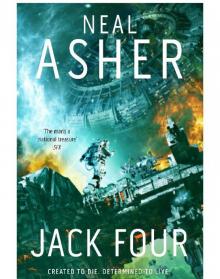 Jack Four
Jack Four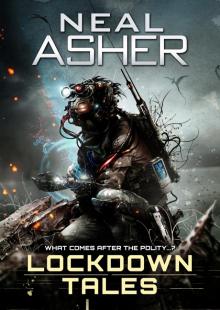 Lockdown Tales
Lockdown Tales The Warship
The Warship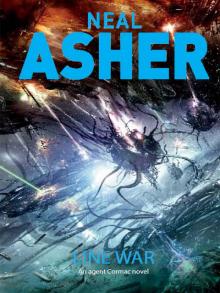 Line War
Line War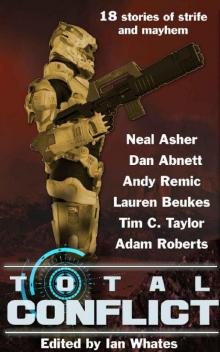 Total Conflict
Total Conflict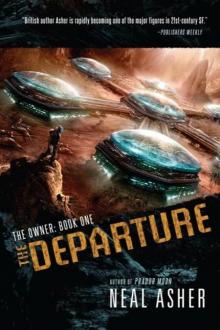 The Departure
The Departure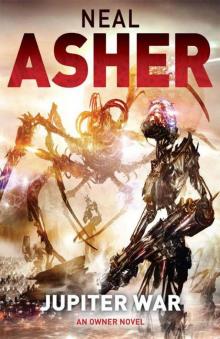 Owner 03 - Jupiter War
Owner 03 - Jupiter War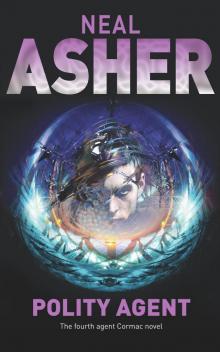 Polity Agent
Polity Agent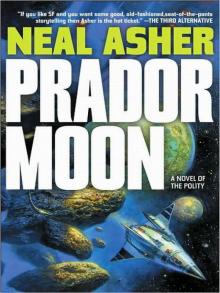 Prador Moon
Prador Moon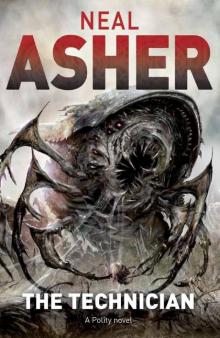 The Technician
The Technician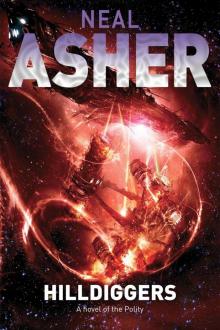 Hilldiggers
Hilldiggers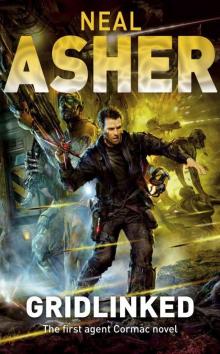 Gridlinked
Gridlinked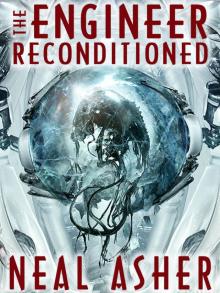 The Engineer ReConditioned
The Engineer ReConditioned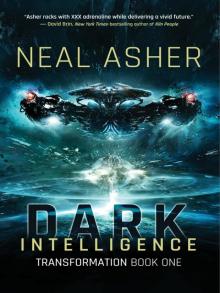 Dark Intelligence
Dark Intelligence The Soldier: Rise of the Jain, Book One
The Soldier: Rise of the Jain, Book One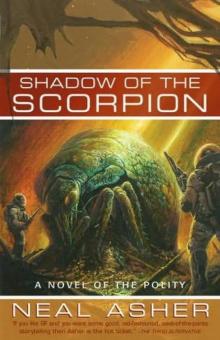 Shadow of the Scorpion p-2
Shadow of the Scorpion p-2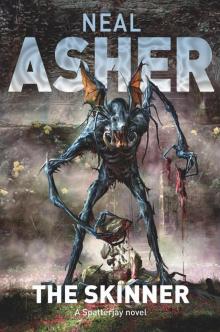 The Skinner
The Skinner The Soldier
The Soldier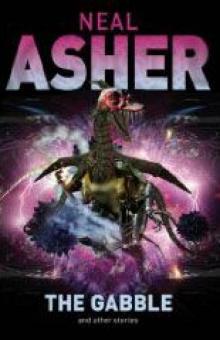 The Gabble p-13
The Gabble p-13 The Gabble and Other Stories
The Gabble and Other Stories The Parasite
The Parasite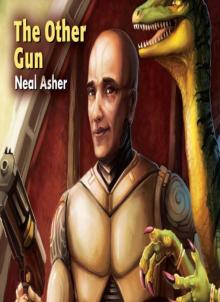 The Other Gun
The Other Gun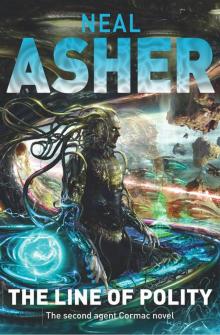 The Line of Polity
The Line of Polity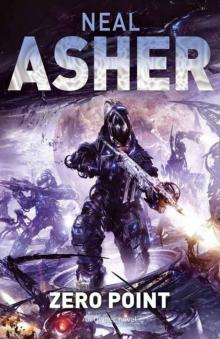 Zero Point (Owner Trilogy 2)
Zero Point (Owner Trilogy 2)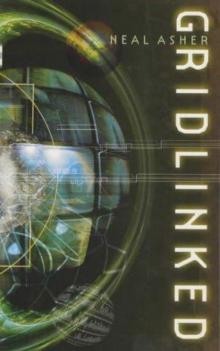 Gridlinked ac-1
Gridlinked ac-1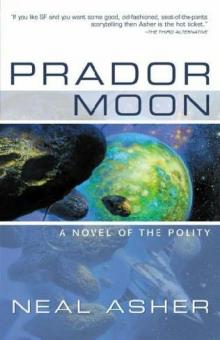 Prador Moon p-1
Prador Moon p-1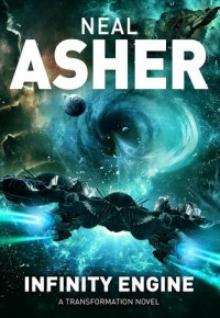 Infinity Engine
Infinity Engine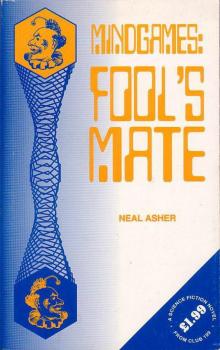 Mindgames: Fool's Mate
Mindgames: Fool's Mate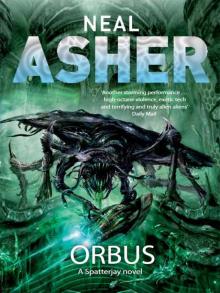 Orbus
Orbus Africa Zero
Africa Zero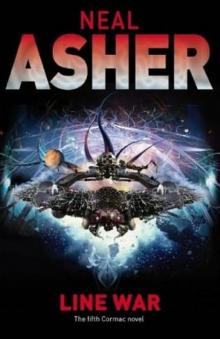 Line War ac-5
Line War ac-5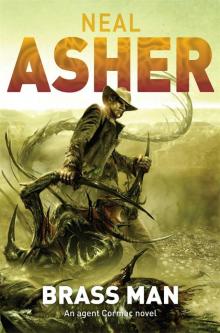 Brass Man
Brass Man The Departure to-1
The Departure to-1 Cowl
Cowl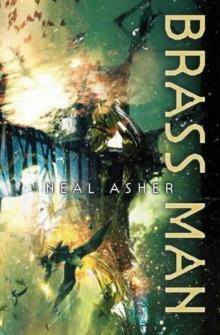 Brass Man ac-3
Brass Man ac-3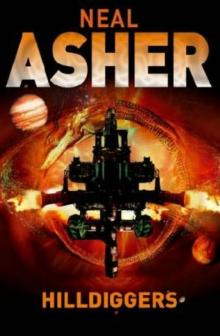 Hilldiggers (polity)
Hilldiggers (polity)![Greg Bear - [Eon Trilogy 1] - Eon (rescan) (v1.0) Read online](http://i1.bookreadfree.com/i2/04/08/greg_bear_-_eon_trilogy_1_-_eon_rescan_v1_0_preview.jpg) Greg Bear - [Eon Trilogy 1] - Eon (rescan) (v1.0)
Greg Bear - [Eon Trilogy 1] - Eon (rescan) (v1.0) The Skinner s-1
The Skinner s-1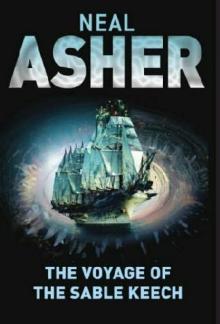 The Voyage of the Sable Keech s-2
The Voyage of the Sable Keech s-2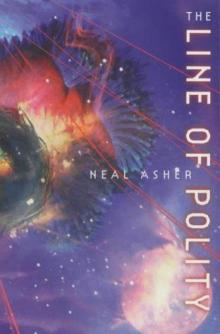 The Line of Polity ac-2
The Line of Polity ac-2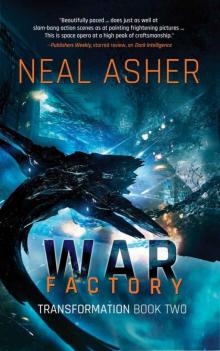 War Factory: Transformations Book Two
War Factory: Transformations Book Two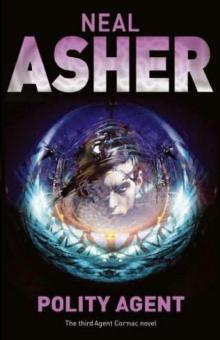 Polity Agent ac-4
Polity Agent ac-4